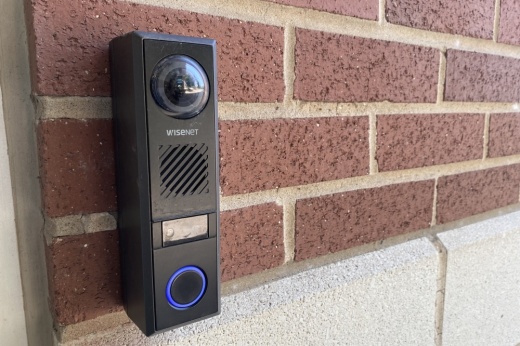All Frisco ISD schools will be equipped with a new doorbell system installed near building entrances once the 2023-24 school year begins Aug. 9. The doorbells themselves are similar to the popular Ring video camera systems, Director of Security Kevin Haller said.
“It’s similar to Ring, it's similar to Access, but it's made by the manufacturer that does most of our cameras and the software that we run the system through,” Haller said.
The doorbell cameras are also linked to their school’s phone system, which allows a guest to push the buzzer and a staff member at the front desk can pick up the phone to speak to them while watching the video feed on a monitor.

“It’s really gone to another level,” Haller said.
Zooming out
Even before the doorbells, FISD schools already had checks in place to keep both students and staff safe.
“Our interior doors have always been locked,” Haller said. “No parent or visitor would be able to go beyond that point. Then, in 2019, we looked at better ways to secure our campuses.”
Smith Elementary School was the first campus to install the cameras in 2019 before some of the district’s other elementary schools and middle schools gradually followed. Wakeland High School was the first high school to install the doorbell cameras in 2022.
“The safest place for our kids to be, when they're not with their parents, is in one of our schools,” Haller said.
Why it matters
One benefit of the new system is its potential to stop certain incidents before they happen.
“Parents divorce,” Haller said. “There's certain procedures that are set in place; when you can visit, when you can't visit.”
One of the biggest issues staff experienced in the early stages of the pilot program was relaying the new camera rules to parents, Haller said. Most parents would park, walk up to the school to pick up their child and have to return to the parking lot to retrieve their ID.
There are also rules in place for when a group is trying to enter the school at once, Haller said.
“If three or four parents come up at the same time, [staff goes] through the regular process,” he said. “Everyone has to show [ID], even if she's the president of the PTA, she has to show it. ... We're real careful about that.”
The additional security is not designed to keep students out of the school when they are supposed to be there, Haller said. School staff at the front offices monitoring the cameras have been trained to recognize enrolled students, some who will also have student ID cards to show the camera if necessary.
“Our mission is to know every student by name and need,” Managing Director of Transportation Jerad Castor said. “A student can show up to the campus, show their student ID, [and staff] can say, ‘Hello Jeffrey. How are you doing today? Come on in.’ And this just provides a more relationable way to process it.”
If a student trying to get into the building does not have an ID, as they are not mandatory at all schools, staff monitoring the cameras can also look up their name in the system to quickly confirm their identity and if they are currently enrolled.
“You're gonna know if it’s a student that you have there; you're not gonna let him in until somebody can take a look at him,” Haller said. “They're not just going to pass him in and show up in the reception area.”
Parents and students are not the only ones benefiting from the new system. Staff members working in the front office are also protected, Assistant Communications Director Korinna Kirchhoff said.
“Think of a high school you've been to,” Kirchhoff said. “You were able to just walk in the front door and then walk straight to the front office staff without anyone stopping you.”
Keep in mind
Adding this extra stop before entering a school goes against most people’s instincts, Haller said.
“We were raised to hold the door open for somebody,” he said. “If you get first to the door, you're holding it up, and everybody goes. We have to say no—no tailgaters, and we control when that buzzer is hit.”
The doorbells would not have been implemented districtwide without the overall positive effect it had on the pilot schools, Haller said. Most visitors, especially at high schools, are parents coming to pick up their child for a doctor’s appointment.
“Once they're vetted, they're told that you can have a seat on the bench or you can go to your car, and we'll send your student now, so there's a whole lot less traffic in that entry area,” he said.





